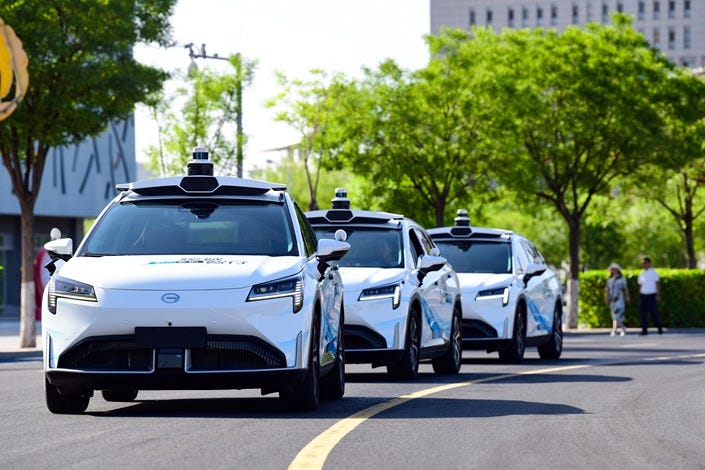Tech Insider: Self-Driving Tech Gets Government Push, Automaker GAC’s Solid-State Battery Goal
Jack Ma’s family trust to sell $871 million in Alibaba shares, European firms want clarity on China’s data transfer rules
A caravan of autonomous taxis take a test drive on July 6 in Ordos, North China’s Inner Mongolia autonomous region. Photo: VCG
China aims to speed up commercialization of self-driving tech
The central government has launched a pilot program that aims to get more autonomous cars on China’s roads and speed up the commercialization of the technology, as automakers bet big that smart car tech like self-driving software will make them stand out with customers.
What the government calls “intelligent connected vehicles” (ICVs) will be allowed to operate in designated areas on a trial basis with a regulatory permit, according to a notice published Friday.
The pilot program is open to companies — like robotaxi firms — that intend to operate ICVs on public roads, as well as the manufacturers of those vehicles.
The goals of the program include improving the functionality and performance of ICVs, as well as establishing regulations and technical standards for the industry, the notice said.
Automaker GAC aims to use solid-state batteries by 2026
Guangzhou Automobile Group Co. Ltd. (GAC) has announced plans to install its own all-solid-state batteries in vehicles by 2026, joining other carmakers in attempting to commercialize a technology that could revolutionize the electric-vehicle (EV) industry.
Solid-state batteries potentially offer a longer lifespan, increased range and faster charging times. GAC’s version can have an energy density of up to 400 watt-hours per kilogram while meeting safety and reliability requirements under extreme conditions, the state-owned auto giant said Friday. By comparison, lithium-ion batteries commonly found in EVs today have an energy density of 200 to 300 watt-hours per kilogram.
However, all-solid-state batteries remain a novel and expensive technology. GAC did not say when it will begin mass producing vehicles powered by such batteries.
Jack Ma’s family trust to sell $871 million in Alibaba shares
Jack Ma’s family trust plans to sell 10 million of Alibaba Group Holding Ltd. American depository shares for about $871 million, regulatory filings showed last week.
The shares will be divested Nov. 21 by JSP Investment Ltd. and JC Properties Ltd., British Virgin Islands-registered companies that are part of Ma’s family trust, according to the filings.
Disclosure of the sales plan came as Alibaba reported quarterly earnings. It posted an 8.5% rise in sales to 224.8 billion yuan ($31 billion) in the September quarter, slightly exceeding average projections. It swung to a net profit of 27.7 billion yuan from a year-earlier loss.
Alibaba also disclosed that it canceled a spinoff of its giant cloud business as a result of tightened U.S. curbs on advanced chips for China.
Alibaba is only worth about half of Tencent
Alibaba’s market value has slumped to only about half that of rival Tencent Holdings Ltd., as the former’s e-commerce-centric business faces sluggish demand and intensified competition.
Alibaba, whose other main business line includes cloud computing, has a market capitalization of $201 billion, while Tencent, focused on social media and gaming, is valued at $384 billion, according to data compiled by Bloomberg.
The divergence in market value also highlights some of the regulatory and macroeconomic issues that have troubled Alibaba.
In recent years, China has sought to rein in the country’s tech giants, with regulators probing Alibaba affiliate Ant Group Co. Ltd. and imposing a $1 billion fine on the fintech company.
Alibaba’s market value had largely been higher than Tencent before the regulatory campaign started in late 2020.
European firms want clarity on China’s data transfer rules
A European business group has called on Beijing to clarify cross-border data transfer regulations it considers too vague or too strict, as they have created challenges such as higher costs for companies doing business in China.
The European Union Chamber of Commerce in China made the remarks last week as it released a survey on the impact of Chinese data regulations, which the government has stepped up in recent years to protect data security.
The survey shows that China’s tighter data rules have prompted some European companies to shift or consider shifting their investments outside of the Chinese mainland, though only 2% and 4% of the 54 respondents, respectively, have done so. A further 13% said they had postponed investment or product-related decisions.




